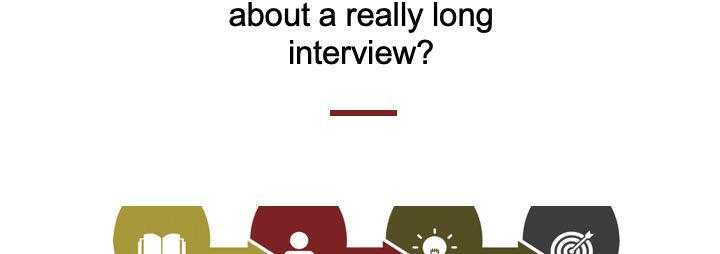What do you do if an interview takes forever?
You need to be scheduling out your breaks. It is unreasonable to go past about two hours of interview time. It is probably unreasonable to go past an hour and a half. Most people can live without a break for an hour but we do start to lose attention. Some people need more breaks either because the interview is intense or they have a back problem and they need to stand up or you’re in a dry climate and they need to drink.
Two hours is an absolute outward max for expecting somebody to be in an interview without a break and really is not recommended. If you think that your interview with a person is likely to go long because there’s just so much to cover or because you’ve heard that person is verbose, you might walk into the interview and say something like, “Hey, I’ve done this for a lot of years. If you’ll let me drive this interview, we are going to get out of here so much quicker. And I promise to let you talk at the end if there’s something I haven’t covered.”
I’ve also had some people that intentionally or unintentionally insisted on going off the scope of the investigation in their responses. So, sometimes it’s simply because they do not know what you’re trying to get at with your questions. The witness interviewee does not know what the wrongdoing is. Other times they either are challenging your investigative focus or they just can’t acknowledge their participation in what you’re asking. And so they want to talk about something else and that diflection can get really hard. And a good thing to do in that situation is to push back from the table, or take your hands off the keyboard/pen, and the body language of that indicates “what you’re telling me right now is not worth me writing down.”
You’re not saying it with words, you’re not interrupting them, but you are giving body language. And I don’t actually raise my hands. I just take them off my pen. But you’re telling people with your body language that “I’m not interested in recording what you’re giving me right now.” You may also say something like, “I don’t understand how that relates to the question I asked you, which was….” Some of those techniques can really help people redirect or refocus or sort of take a deep breath and say, “Okay, I’m nervous and I’m babbling.” And those are a couple of the techniques I have to get people to sort of narrow it back down to the investigative focus that I have for my investigation.

